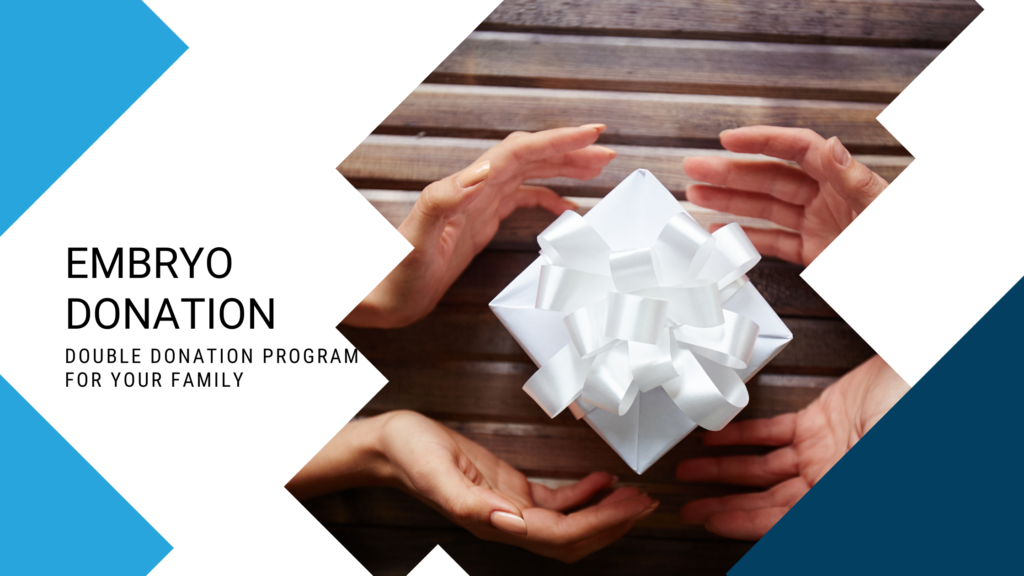
Many of our AtlasCARE IVF couples find that they have extra frozen embryos after their IVF procedure in the Republic of Georgia. This allows them to expand their reproductive options and have another chance at parenthood.
Starting the process of embryo donation
Your journey to parenthood begins with a consultation with our AtlasCARE IVF fertility specialists. During the initial consultation, you will discuss the results of any previous treatments and your medical history. Fertility testing will be arranged. Providing any other relevant medical reports will help our fertility specialist determine the most suitable treatment plan for you.
How to find the right egg donor in Georgia?
Egg donation in Georgia is non-anonymous, meaning that the donor’s photos, educational background, career, and hobbies will be revealed to the recipient(s) but we’ll still keep their contact and personal details private.
Our egg donors are young, healthy women between the ages of 21 and 28 years. Most of them have already been pregnant and have their own children. They do not have any parental rights over the child(ren) born as a result of donation.
The AtlasCARE patient coordinator will provide you with access to the secure online profiles of our donors. Here you can find various information, such as physical traits, family history, education, career, hobbies, and personality of the donor.
Before proceeding with selection, you’ll be asked about the physical features (and other qualities) you desire in your donor (an example photo is highly recommended). Based on your criteria, we’ll select and send PDF files of the most suitable donor profiles for consideration.
How are egg donors selected?
Before being accepted into our egg donation program, all potential donors have to undergo an extensive screening procedure (i.e., medical, fertility, and infectious disease testing) to ensure that they are healthy and fit for donation.
Donors must also meet the following basic requirements:
- Have regular monthly periods
- Have no reproductive or genetic disorder
- Be physically and emotionally healthy
- Have a normal weight (BMI under 28)
- Do not smoke or use drugs
- Be willing to complete each step of the egg donation process
How to choose a sperm donor in Georgia?
Sperm donation in Georgia is non-anonymous, meaning that recipients are allowed to receive any personal information about the donor and vice versa, donors cannot receive information about the recipient/s or the resulting child/children. Moreover, they don’t have parental rights over the child(ren) born as a result of donation.
Just like egg donors, sperm donors also have to go through stringent screening tests to rule out any health or reproductive condition that might affect the baby’s health and development. This involves medical, fertility, and infectious disease testing.
All the characteristics that you look for in a sperm donor will be recorded by the AtlasCARE team. The same physical attributes and qualities (such as hair color, eye color, height, blood group, occupation, education, interests, hobbies) you asked for will be used to find the perfect match for you.
For the purpose of fertilization, we use fresh sperm cells from your chosen donor. After you make the selection, the donor will need to come to our surrogacy agency in Tbilisi to provide a semen sample. The sample will be frozen and stored in secure containers in our clinic until we’re able to proceed with fertilization.
How is our embryo donation program different from embryo adoption?
At AtlasCARE, embryo donation is different from embryo adoption. Our program combines egg and sperm donation to help you have the child you desire. For your cycle, we use only fresh donor eggs and fresh donor sperm, which are exclusively yours.
Unlike embryo donation, embryo adoption uses leftover embryos from previous IVF cycles to help individuals/couples attempt pregnancy via IVF. It is basically the adoption of embryos from another individual/couple that allows the adoptive mother to get pregnant and give birth to a genetically unrelated child. Embryo adoption is not allowed in Georgia.
What are the embryo donation success rates?
Success rates for embryo donation using fresh donor eggs and donor sperm are as high as 70% per cycle. Embryo donation treatments are extremely successful because donor eggs and sperm are obtained from young, healthy donors who have successfully completed all steps of the screening process and have satisfied all donation requirements. Moreover, egg donors who have positively contributed to a successful pregnancy through previous donation are usually re-invited for another donation cycle.
What is the process of embryo donation in Georgia?
Embryo donation involves placing the embryos that were created using the donor’s eggs and sperm in a woman’s uterus in order to establish a pregnancy. Before the transfer, the female patient is required to take medication to prepare her uterus for pregnancy. Once the uterine lining becomes thick enough, frozen embryos are thawed and transferred into the patient’s (or surrogate’s) uterus.
Frozen embryo transfer
A Frozen Embryo Transfer (FET) is a cycle in which the frozen embryos from a previous fresh IVF cycle are thawed and then transferred to the uterus of the intended mother. The actual transfer of thawed embryos is performed in our office without anesthesia and is essentially non-invasive.
Start a family with AtlasCARE IVF!
Embryo donation successfully combines egg and sperm donation to help individual and couples who struggle with infertility to experience the wonders of pregnancy and childbirth.
Our journey coordinators will be with you every step of the way to answer any questions or concerns you have as we plan your treatment journey.